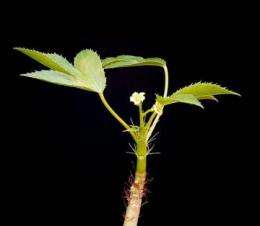Jatropha can provide a biofuel that may help improve jet performance while reducing CO2 emissions. Image credit: Frank Vincentz via Wikimedia Commons
Recently, Air New Zealand ran a test flight of a jet plane fueled with a biofuel blend made with jatropha. The results showed a fuel savings of 1.2%, amounting to more than a ton of fuel over the course of a 12-hour flight. The CO2 emissions from the airplane were reduced by an even more impressive amount -- in excess of 60%. The flight is one that offers some evidence that perhaps it is feasible for airlines to adopt biofuels in order to reduce the emission of greenhouse gases.
Jatropha has been recognized recently as a viable alternative to many biofuels. Gas 2.0 reports on the reasons that jatropha seems to show such promise:
"A second generation biofuel, jatropha is grown on land that doesn't compete with food. It requires almost no care and very little water. Another major benefit of jatropha is that, due to its ability to take hold in harsh wastelands, it can be used to help stop erosion in these areas and reclaim them for agricultural production."
Air New Zealand worked with Rolls-Royce, Boeing and Honeywell's UOP to develop drop-in biofuel technology, which involves a commercial Boeing 747 carrying a Rolls Royce engine. The fuel used is a blend of standard jet fuel and kerosene derived from jatropha oil.
Of course, the main concern is cost. With oil prices so low right now, jet fuel is relatively inexpensive. The cost-efficiency of the process of producing the biofuel is not as competitive as it could be. However, if oil prices rise again in the future, such biofuels may become more desirable from a cost standpoint -- as they already are from an environmental standpoint.
© 2009 PhysOrg.com



















